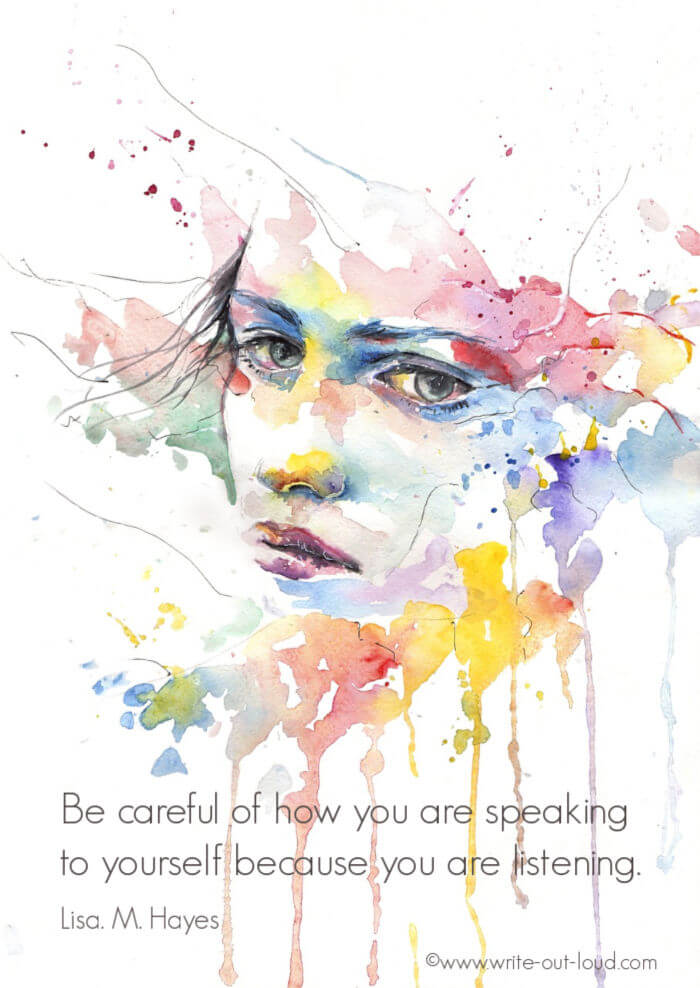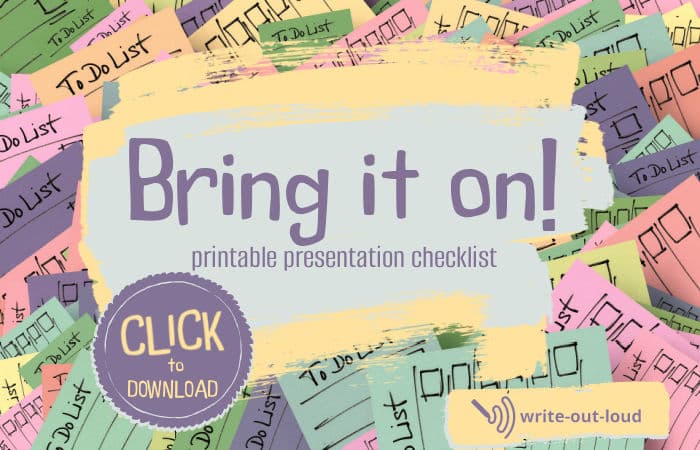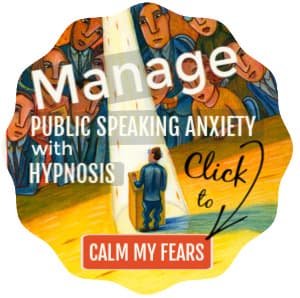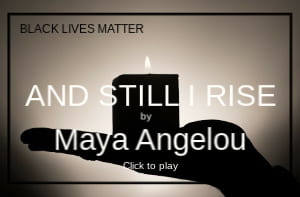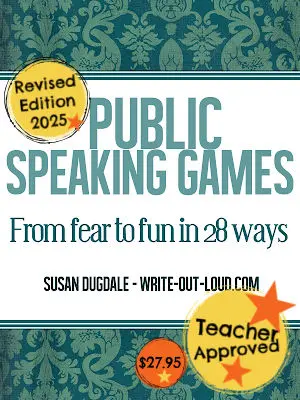Manage public speaking nerves: 5 ways
How to beat negative self-talk, use a reality check scale & more
By: Susan Dugdale
An attack of public speaking nerves is the unpleasant result of one of the most commonly cited of dreaded events: having to make a speech.
Do we fear public speaking more than anything else?
Some people are nervous around spiders. Others about flying, but the biggest and ugliest of them all we're frequently told, reducing more people than anything else to a state for fear-filled, knee-knocking, tummy-knotted jitters, is public speaking.*
Perhaps that's true. Perhaps it's not. Either way, it doesn't alter the reality for many people who find speaking in public frightening.
The official word for that fear is glossophobia which is derived from the Greek γλῶσσα glōssa, meaning tongue, and φόβος phobos, fear or dread. Put those together and you get 'fear of talking'.
(*The old story about people being more scared of public speaking than anything else is not completely true. Find out more.)
What can you do about public speaking nerves?
Are you one of the many for whom public speaking is their worst nightmare?
Here's 5 strategies to help you take control of public speaking nerves.
- Flipping negative-self-talk for positive
- The reality check scale
- Understanding public speaking nerves | what happens to our bodies and why
- Fantasy land beliefs and expectations
- The bring-it-on preparation checklist
1. Flipping negative-self-talk for positive
Have you ever stopped to listen to what you fill your mind with?
Most of us have a running commentary that is interpreting events as they unfold throughout our day.
It's a back-of-your-mind voice, ever present and ever burbling on. Consciously tuning into that soundtrack can be very enlightening.
If what you're hearing is the constant drip-drip-drip of negativity, it's time to flip the message and flood your mind with something more constructive.
Constantly telling yourself that you're hopeless, stupid, a failure or whatever limiting spin you bombard yourself with is self-sabotaging, unkind and cruel.
Challenge that voice. You do not have to accept a tirade of abuse.
Try slowing it down, shutting it up, flipping its channel by:
- reminding yourself of situations where you've adapted and coped well. And yes, they will be there!
- exchanging harmful generalizations like 'I'm always hopeless' for permissions to be a beginner, like 'It's OK to make mistakes - that's how we learn.'
- acknowledging the fear behind the negative-self-talk with supportive comments like this:
'It's OK to be frightened about public speaking but the adult in me is looking after you - the scared child. I'm holding your hand and we're going to go slowly, one step at a time.' - replacing strong, emotive language with neutral words.
'I totally suck at this' becomes 'OK, so I've still got a bit to learn starting with...'
Treat yourself as you would treat someone in need of care
Be kind but firm. It takes repeated, sustained practice to rewire a habitual soundtrack, and it may sound false at first. But persevere.
Think of someone you love dearly. Would you treat them as poorly as you are treating yourself? Probably not. You would give them your hand, guide and reassure them.
Each of us deserves to give ourselves the best we possibly can.
2.The reality check scale | checking in on truth
It's a total disaster, a catastrophe, a major debacle of gigantic proportions ...
Check the reality of your public speaking nerves against a scale.
If your present state of mind was on a scale of 1-10 where would it be?
10 is a total cataclysmic disaster of world-shattering significance
1 is a minor temporary blip
Are you literally likely to die through giving a speech?
Is the world ending?
Are your loved ones threatened?
What is the very worst-case scenario that public speaking nerves can cause?
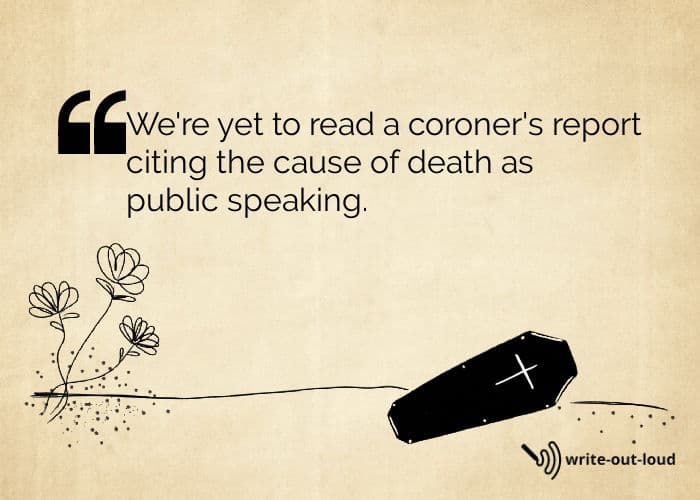
Your answer will put fear in perspective. Once it's there it is much more manageable. If the very worst that can happen is forgetting what you're going to say, you can do something about it. Practice.
If it's something beyond your control, like a tidal wave washing away the entire building, check it for the likelihood of its occurrence and let it go!
You can only ever control what is within your reach. Attempting anything else is futile and a waste of your energy.
Fears retreat when they are faced
Accept and focus on what you can do right now. Fears retreat when they're faced. What you thought was 7 or 8 on the scale when you stood up to speak becomes 5 when you've remembered to breathe properly. By the time you're into your speech and the benefits of practice kick in, it's 3 and those public speaking nerves are fading fast.
3. Understanding public speaking nerves
It can be a great help to know what happens at a physiological level to our body's when we're about to do something challenging.
Sometimes through not being aware of typical or normal physical responses we misinterpret them as something to be afraid of or frightened by. And through being fearful, instead of managing the manifestations of public speaking nerves, we amplify them.
Fight or flight
The natural response to a challenge like making a speech is the triggering of a series of complex chemical reactions commonly called the fight or flight response.
That response is the cause of the quickening heart rate, faster breathing, butterflies in the tummy - in short, all the symptoms collectively called public speaking nerves when they tip over the edge of anticipatory excitement into 'help, what have I let myself in for!'.
The symptoms themselves are normal. It's what we do with them that impacts positively or negatively. We can manage, channel and transform them usefully or we can let them run rampant. Having done both, I can honestly say managing them is the preferred option!
Click to read more about ways to manage public speaking anxiety.
4. Fantasy land beliefs and expectations
Having unreal expectations or beliefs is a sure-fire way to add more stress to an upcoming presentation or speech.
Do you have to be perfect?
Does absolutely everybody have to love your presentation?
Is success only possible if everybody laughs in the right place?
Give yourself clear and real criteria for measuring success.
Is it real that you'll be flawlessly perfect if this is your first, second or third speech?
If you drop the whiteboard marker while you're writing something up is that a complete failure?
Why should everybody love your speech? It would be nice if they did but do you love every speech you listen to?
Put absolutes aside and focus on specific aspects to evaluate your speech.
For example:
- delivery - fluency, vocal variety, body language
- use of visual aids - how to use props effectively,
- audience - content appropriate to their needs, handling of Q & A session, engagement
The reality is that you will achieve, perhaps exceed, in some areas and find room for improvement in others. There is always a next time. You do not have to be perfect now.
5. The bring-it-on preparation checklist
Treat your public speaking nerves with a Bring-It-On List and watch them wither.
Go through every aspect of your speech and think of the very worst that could happen.
Cover off preparation and presentation. Imagine the event rolling out in front of you like a movie. As each scene comes along, slow it down and look for those possibilities that could trip you up. Yes, the devil truly is in the detail!
Here's a few suggestions to get you started.
- Do you know the date, place, and time the speech is to be delivered?
- Do you know who the audience is going to be?
- Have you researched, planned, prepared and practiced sufficiently to give your speech confidently?
- Does it fit the time given?
- If there is a Q & A session have you thought through the types of questions you could get and prepared answers?
- If you're using cue or note cards are they well prepared?
- Have you given the person introducing you some introductory notes about how to lead in to your talk?
- Where will you be waiting before you're asked to come up to present?
- Do you know where you are on the agenda if there is more than one speaker?
- Are your props suitable? Too big, too small to be seen...
- If you're using a stand for your notes, is it the right height for you?
- Have you checked the seating plan to see whether or not the sight lines are OK?
- Have you tested the sound system and any other electronic gear you might be using?
- Have you sorted your clothes out and done a run through wearing them?
- Have you arranged transport to get there if you need to?
For everything you've identified that could go wrong, make a plan ahead of time to meet it. A Bring-It-On list minimizes potential hazards, helping you take positive control over public speaking nerves in every area you can.
Get yourself an example checklist to adapt to fit your own situation. Click to download a printable presentation checklist.
For more to help with overcoming anxiety of public speaking:
- Breathing exercises to let go fear and help you speak confidently
- And for those few of you for whom the mere thought of public speaking triggers a full-blown panic attack, a page on using hypnosis to effectively manage public speaking fear.
Are we more scared of speaking in public than anything else?
Check here for an interesting analysis of how we may have arrived at that conclusion. It may not be completely true that 75% of people in America fear public speaking more than anything else. Besides, the data that was drawn from is now very much out of date and yet, it is still repeated unquestioningly.Here's an update from the same writer, nine years after the article above was published.
The percentage of Americans fearing public speaking is still wrong and still being quoted as if it were truth. Do 77% of Americans fear public speaking? No! That percentage described stage fright in Swedes who also had social anxiety disorder.

About the Author: Susan Dugdale, founder of write-out-loud.com, is a qualified teacher of English and drama with over 40 years of experience. Drawing on her professional expertise and her personal journey from shyness to confidence, Susan creates practical, real-world resources to help people find their voice and speak with power.
